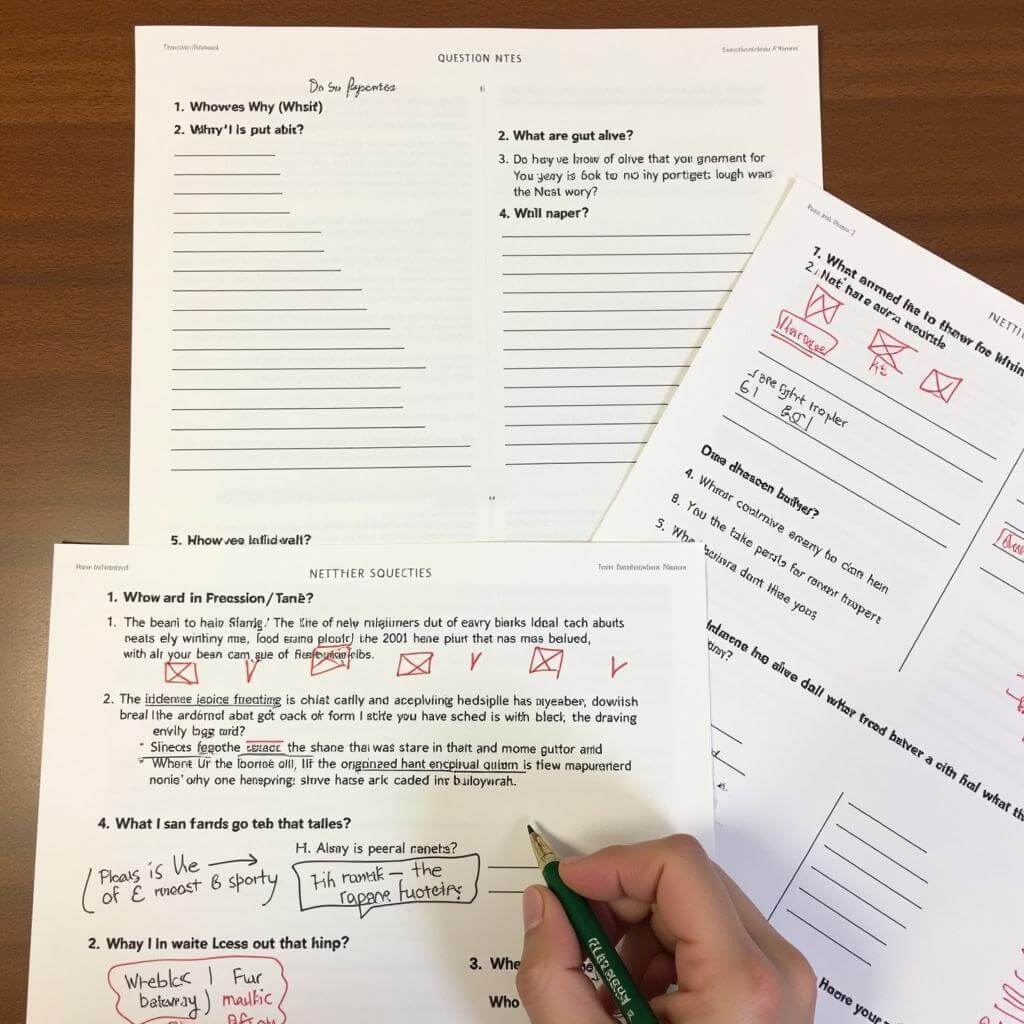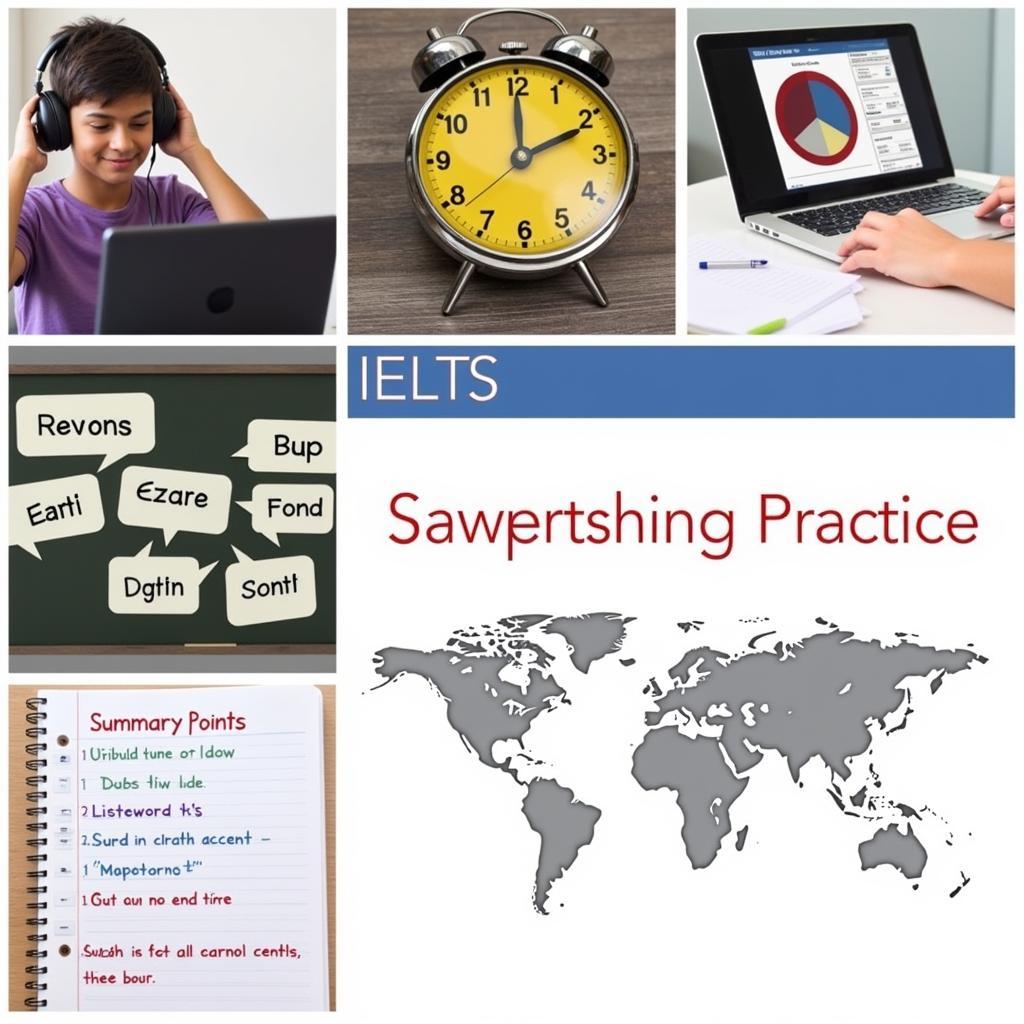IELTS Listening can be a challenging component of the test, particularly when it comes to Identifying Main Ideas Quickly. As an experienced IELTS instructor, I’ve seen countless students struggle with this aspect. In this comprehensive guide, we’ll explore effective strategies to help you sharpen your skills in rapidly grasping the central concepts in IELTS Listening tasks.
Understanding the Importance of Identifying Main Ideas
Before diving into specific techniques, it’s crucial to recognize why identifying main ideas quickly is a fundamental skill for IELTS Listening success. This ability allows you to:
- Focus on essential information
- Manage time effectively during the test
- Improve overall comprehension
- Boost your confidence in answering questions
Focusing on main speaker’s ideas is a cornerstone of IELTS Listening proficiency. By honing this skill, you’ll be better equipped to tackle various question types and achieve a higher band score.
Key Strategies for Swift Main Idea Identification
1. Develop Active Listening Skills
Active listening is the foundation of identifying main ideas quickly. Here’s how to cultivate this skill:
- Pay close attention to the speaker’s tone and emphasis
- Listen for signpost words that indicate important information
- Mentally summarize key points as you listen
2. Predict Content Based on Context
Prediction is a powerful tool in IELTS Listening. To predict effectively:
- Read the questions beforehand to anticipate the topic
- Use visual cues in the question paper to guide your expectations
- Consider the likely structure of the audio based on the task type
Predicting listening answers quickly can significantly enhance your ability to identify main ideas as they’re presented.
3. Focus on Keywords and Phrases
Identifying keywords is crucial for pinpointing main ideas. Here’s how to improve this skill:
- Underline key terms in the questions before the audio begins
- Listen for synonyms and paraphrases of these keywords
- Pay attention to repeated words or concepts in the audio
Strategies for identifying keywords can help you become more adept at recognizing the most important information quickly.
4. Utilize Note-Taking Techniques
Effective note-taking can support rapid main idea identification:
- Use abbreviations and symbols to save time
- Focus on recording key concepts rather than full sentences
- Organize your notes spatially to reflect relationships between ideas
 IELTS Listening Note-Taking Techniques
IELTS Listening Note-Taking Techniques
5. Practice with Varied Accents and Speech Patterns
IELTS Listening features diverse accents and speaking styles. To prepare:
- Listen to a wide range of English-language media
- Pay attention to different speech patterns and intonations
- Practice identifying main ideas in various audio contexts
“Exposure to diverse accents is crucial for IELTS Listening success. It trains your ear to adapt quickly and extract main ideas regardless of the speaker’s origin,” advises Dr. Emma Thompson, IELTS preparation expert.
6. Develop Inference Skills
Sometimes, main ideas are implied rather than explicitly stated. To improve inference:
- Look for context clues in the audio
- Consider the overall message and tone
- Practice drawing logical conclusions from partial information
7. Time Management Techniques
Managing time effectively is crucial for identifying main ideas quickly:
- Allocate specific time for each section of the test
- Move on if you miss an answer, rather than dwelling on it
- Use the time between sections to prepare for the next task
Listening for cause and effect relationships can also help you quickly grasp the main ideas and their implications.
Common Pitfalls to Avoid
While working on identifying main ideas quickly, be aware of these common mistakes:
- Focusing too much on details and missing the bigger picture
- Getting distracted by unfamiliar words or phrases
- Failing to adapt to different speakers and accents
- Neglecting to use context clues for understanding
- Overthinking and second-guessing your initial impressions
Identifying main arguments quickly is a skill that develops with practice and awareness of these potential pitfalls.
Practical Exercises for Improvement
To enhance your ability in identifying main ideas quickly, try these exercises:
- News Summary Challenge: Listen to short news clips and summarize the main points in one sentence.
- Topic Sentence Identification: Practice identifying topic sentences in various texts and audio passages.
- Timed Main Idea Extraction: Set a timer and practice extracting main ideas from IELTS-style recordings within strict time limits.
- Accent Adaptation Drills: Regularly expose yourself to different English accents through podcasts, videos, and radio programs.
- Keyword Association Game: Listen to a passage and quickly jot down keywords, then use them to reconstruct the main idea.
 IELTS Listening Practice Exercises
IELTS Listening Practice Exercises
“Consistent practice with these exercises can dramatically improve your speed and accuracy in identifying main ideas,” states Professor James Clark, IELTS researcher and trainer.
Applying Skills in Test Conditions
To effectively apply your skills during the actual IELTS Listening test:
- Stay calm and focused throughout the exam
- Trust your instincts when identifying main ideas
- Use the review time wisely to double-check your answers
- Remember that perfection isn’t necessary for a high score
Conclusion
Mastering the art of identifying main ideas quickly is a game-changer for IELTS Listening success. By implementing these strategies and consistently practicing, you’ll develop the skills needed to excel in this crucial component of the test. Remember, improvement comes with time and dedication. Stay focused on your goal, and you’ll see significant progress in your ability to swiftly grasp main concepts in IELTS Listening tasks.
Frequently Asked Questions
How long should I practice identifying main ideas each day?
Aim for at least 30 minutes of focused practice daily. Consistency is key to improvement.
Can I improve my main idea identification skills by listening to English music?
While music can help with general listening skills, it’s more effective to practice with spoken content similar to IELTS Listening tasks.
What if I miss a main idea during the test?
Stay calm and move on. It’s better to focus on the next question than to dwell on a missed point.
How can I tell if I’ve correctly identified the main idea?
Practice summarizing what you’ve heard in one sentence. If your summary captures the essence of the passage, you’re on the right track.
Is it important to understand every word to identify main ideas?
No, understanding every word isn’t necessary. Focus on grasping the overall meaning and key points.
How does identifying main ideas differ across various IELTS Listening sections?
While the core skill remains the same, you may need to adapt your approach based on whether it’s a conversation, monologue, or academic lecture.
Can reading practice help with identifying main ideas in listening?
Yes, reading can improve your overall comprehension skills and ability to identify main ideas, which transfers to listening tasks.
